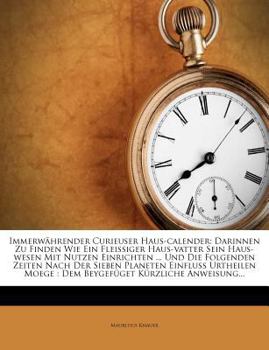Immerwahrender Curieuser Haus-Calender: Darinnen Zu Finden Wie Ein Fleissiger Haus-Vatter Sein Haus-Wesen Mit Nutzen Einrichten ... Und Die Folgenden Zeiten Nach Der Sieben Planeten Einfluss Urtheilen
Select Format
Select Condition 
Book Overview
This work has been selected by scholars as being culturally important, and is part of the knowledge base of civilization as we know it. This work was reproduced from the original artifact, and remains as true to the original work as possible. Therefore, you will see the original copyright references, library stamps (as most of these works have been housed in our most important libraries around the world), and other notations in the work.This work is in the public domain in the United States of America, and possibly other nations. Within the United States, you may freely copy and distribute this work, as no entity (individual or corporate) has a copyright on the body of the work.As a reproduction of a historical artifact, this work may contain missing or blurred pages, poor pictures, errant marks, etc. Scholars believe, and we concur, that this work is important enough to be preserved, reproduced, and made generally available to the public. We appreciate your support of the preservation process, and thank you for being an important part of keeping this knowledge alive and relevant. This description may be from another edition of this product.
Format:Paperback
Language:English
ISBN:1273242564
ISBN13:9781273242564
Release Date:January 2012
Publisher:Nabu Press
Length:132 Pages
Weight:0.55 lbs.
Dimensions:0.3" x 7.4" x 9.7"
Customer Reviews
5 customer ratings | 4 reviews
There are currently no reviews. Be the first to review this work.





















